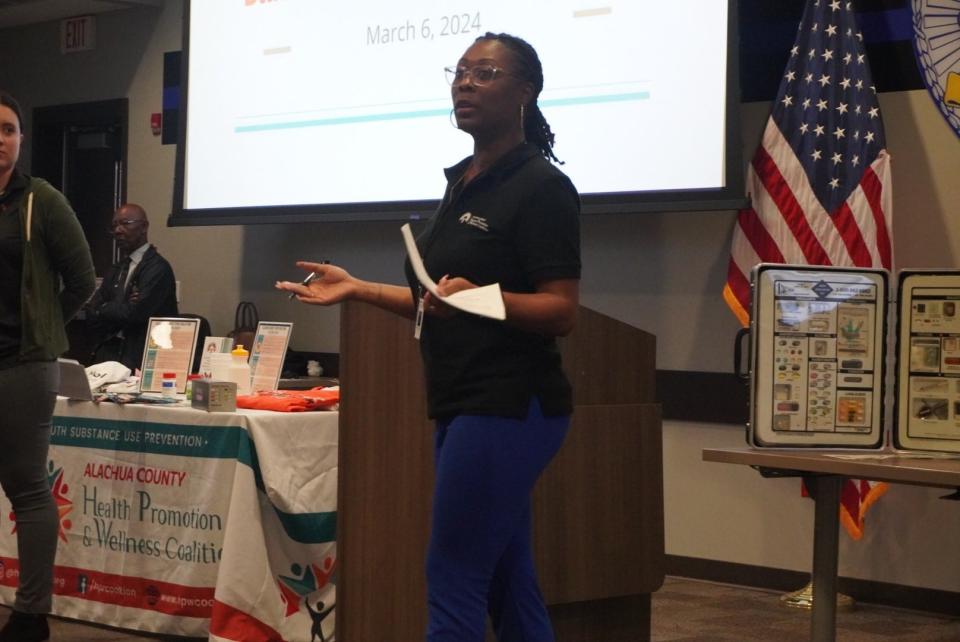Vaping epidemic in Gainesville and Alachua County was focus of a task force's meeting
Combating the vaping epidemic in the local community was the featured topic at the March monthly meeting of the Black on Black Crime Task Force.
A presentation on vaping by the Alachua County Health Promotion and Wellness Coalition highlighted the meeting held Wednesday at Gainesville Police Department headquarters.
“The potency of the drugs are affecting their brains that have not been fully developed yet,” said LaShay Johnson, the coalition’s program director. “The youth are being targeted through the ads. We need everybody to know how serious this is. The youth slipping into addiction have been accelerated post-pandemic. They’re going to be dropping dead more to drugs than just gun violence. It’s life or death at this point.”
The coalition hosts programs like “Friday Nights Done Right” to promote sober parties that encourage youth to have an enjoyable time without drugs or alcohol.
The coalition is a non-profit organization founded in 2013 that works to prevent substance use among youth and adults, enhance wellness and improve the quality of life of all county residents.
Young people are finding more creative ways to vape and drink alcohol, Johnson said.
During her “Hidden in Plain Sight” presentation, Johnson said substances and paraphernalia are being used through items that look like hairbrushes, USB drives, soda cans, lint rollers, hairspray bottles, water bottles and other items.
“March is a critical month for the school year,” said Darry Lloyd, spokesman and chief investigator for the Eighth Judicial Circuit’s State’s Attorney Office. “Juvenile crime increases through the month of March. You need to be aware of the items coming through your household. It may not come from your child but from their friends.”
Drugs are more potent now than they were in the past and they are affecting the youth more severely, said Gregory Pelham, chair of the coalition’s board of directors.
Guardian Newsletter: Gainesville Guardian will transition to an email newsletter format
The average marijuana bud had 4% THC (an active ingredient that causes intoxication) in 1990, but that level is now up 28%., according to the coalition.

Concentrates and synthetics are developed in labs to gain addictive qualities. Concentrates like edibles have up to 95% THC levels, according to drug experts.
These products raise the risk levels of anxiety, depression, panic attacks, paranoia, psychosis and schizophrenia, and Pelham said there have also been issues with concentrating, memory and judgement of youth because the brain is not fully developed until age 25.
“Most of the time, they can’t remember what you just said,” Pelham said when describing the youth he meets. “It is a growing trend we see.”
Amy Patrick, the coalition’s program coordinator, talked about the origins of vaping and the different flavors that are being used.
Below are resources families can use to address substance abuse.
Substance use and mental health resources for inpatient and outpatient care are the UF Health Florida Recovery Center at 855-265-4372, UF Health Psychiatric Hospital at 352-265-5481, Diversified Program Services at 866-720-3784, Meridian Behavioral Healthcare at 800-330-5615, The Crisis Line at 352-374-5600, Metamorphosis Alachua County Substance Abuse Program at 352-381-0150.
Resources for counseling and behavioral and mental health are Alcoholics Anonymous at 352- 372-8091, Recovery Awareness Counseling at 352-440-6622, UF Counseling and Wellness Center at 352-392-1575, CDS Family and Behavioral Healthcare at 352-244-0628 and Azalea Mental Health Care at 352-481-2700.
For more information, visit www.hpwcoalition.org.
This article originally appeared on The Gainesville Sun: Coalition presents perils of vaping to task force in Gainesville

